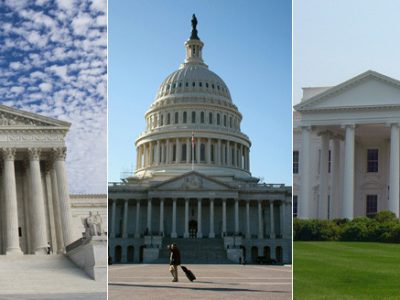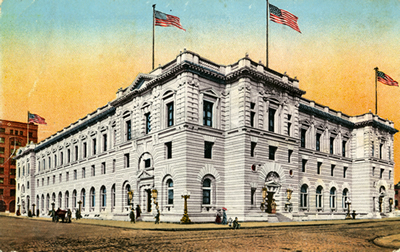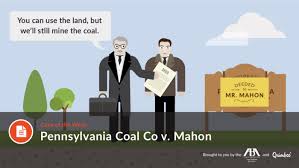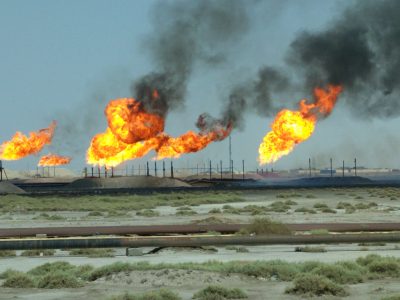Litigation
30 Years of U.S. Climate Policy
Here’s a timeline of the victories and defeats since 1992.
Thirty years ago, the United States joined the U.N. Framework Convention on Climate Change (UNFCCC). The decades since then have been a saga of victories and defeats for U.S. climate policy. Progress has been made under one President, only to be battered down by the next one. This to-and-fro is a sobering reminder of how …
Continue reading “30 Years of U.S. Climate Policy”
CONTINUE READINGThe Year Ahead
Here are the top ten environment and energy developments to watch for.
Here we are, starting another year. Last year turned out to have some major environmental developments. The most notable were the Supreme Court’s ruling in West Virginia case, striking down the Clean Power Plan, and the passage of the Inflation Reduction Act, with its huge economic incentives for clean energy. Here’s quick rundown of what …
Continue reading “The Year Ahead”
CONTINUE READINGThe Ninth Circuit Court of Appeals’ 10 Most Important Environmental Law Decisions of 2022
Climate Change, Water Rights, Environmental Justice & Federalism Issues Highlighted the Ninth Circuit’s Prodigious Environmental Docket This Year
I’ve shared in previous posts my view that the U.S. Court of Appeals for the Ninth Circuit is–after the U.S. Supreme Court–the most influential court in the nation when it comes to environmental and natural resources law. That’s true for two related reasons: first, the sprawling Ninth Circuit encompasses nine different states (including California) and …
CONTINUE READINGReflections on a Century of “Regulatory Takings” Law
A Century Ago, the Supreme Court Created a Transformative Legal Doctrine Out of Whole Cloth
One hundred years ago this month, the U.S. Supreme Court issued a radical constitutional decision that over the last century has proven enormously consequential in a host of environmental, natural resources and public health contexts. In the December 1922 decision Pennsylvania Coal Company v. Mahon, a divided Supreme Court created the constitutional doctrine of “regulatory …
Continue reading “Reflections on a Century of “Regulatory Takings” Law”
CONTINUE READINGA Great Victory For Electric Cars
But Beware: Neanderthal GOP Judges Are Waiting To Strike It Down
With all the attention being paid to Volodymyr Zelenskyy’s visit to Washington, and the release of the January 6th Committee, you might have missed the (second) most important environmental story of the week: The U.S. Postal Service will buy 66,000 vehicles to build one of the largest electric fleets in the nation, Biden administration officials …
Continue reading “A Great Victory For Electric Cars”
CONTINUE READINGThe Coming Ground War For Missing Middle Housing
Municipalities Continue to Maintain and Erect New Barriers To Homes For Working People
Last year, the California Legislature enacted SB 9, which required local governments to allow duplexes (and with ADUs, sometimes triplexes and quadraplexes) in single-family zones. Housing advocates rejoiced, and NIMBYs screamed that it was the end of the world and would lead to “Manhattanization” (because as we all know, Manhattan is famous for its duplexes). …
Continue reading “The Coming Ground War For Missing Middle Housing”
CONTINUE READINGUCLA Environmental Law Clinic Students’ Work Used in Litigation for Improved Refinery Monitoring
East Yard Communities for Environmental Justice, represented by Earthjustice, filed a petition drafted by UCLA ELC students
On Monday, environmental-justice advocates filed a petition drafted by two of our amazing UCLA Environmental Law Clinic students, Sarah Repko and Monica Heger, opening litigation to improve monitoring of petroleum refineries in Southern California. This spring, Sarah and Monica had the exciting opportunity to work with Earthjustice’s Community Partnerships program to prepare litigation enforcing state …
CONTINUE READINGWasting Gas
A proposed rule limiting flaring and venting of natural gas is a win for everyone except greedy oil and gas operators.
Yesterday, the Interior Department posted a proposed rule to limit flaring and venting of natural gas on public lands. The rule will be good for everyone except the oil and gas operators who waste the gas, increasing methane and carbon emissions while giving the public nothing in return. The rule is clearly a step in …
Continue reading “Wasting Gas”
CONTINUE READINGWhat is jurisdiction, and why is it important to climate change litigation?
Local actors seek climate change damages from the biggest fossil fuel companies through state law litigation In the wake of West Virginia v. EPA and the Supreme Court’s deregulatory trend, state action remains an avenue for climate change adaptation and mitigation. While the specter of the major questions doctrine hampers most federal agency actions to …
Continue reading “What is jurisdiction, and why is it important to climate change litigation?”
CONTINUE READINGDo Trump-Appointed Judges Differ when Deciding Environmental Cases?
Student analysis identifies disparities in judicial outcomes
(This post was authored by Grayson Peters, a JD candidate at Berkeley Law and CLEE research assistant.) Do federal judges appointed by former President Trump rule differently in environmental disputes than judges appointed by other presidents? An analysis by two Berkeley Law students finds that they do in a few key areas of judicial decision-making. …
Continue reading “Do Trump-Appointed Judges Differ when Deciding Environmental Cases?”
CONTINUE READING










